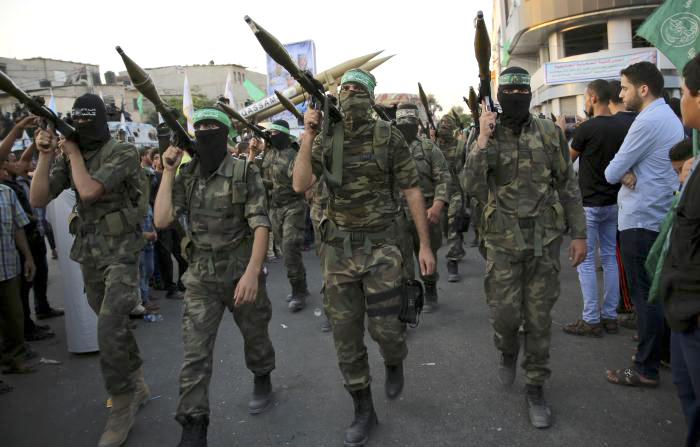IN THE MEDIA
Devious Gaza terrorists don’t seek peace – they’d prefer dead Israelis
July 30, 2018 | Mark Leibler

The Australian – 30 July 2018
If we are to achieve peace between Israel and the Palestinians, it won’t happen if we are unable to shift the biased mindset towards Israel.
It was somewhat heartening that when Hamas followed up its so-called Great March of Return protests in May with rocket attacks on civilian targets in Israel, some of the broader international censure was appropriately directed at the Hamas leadership. If the international community had taken a similarly principled stance during the earlier border violence, Hamas would have been less inclined to execute them.
Contrary to reports attributing the violence to the opening of the US embassy in Jerusalem, large-scale gatherings of Palestinians and attempts to breach Israel’s border with Gaza predated that.
The organisers made it plain that Gazans were being mobilised for what their terrorist leaders told them was a return to their rightful homeland. The transparent objective of Hamas, as always, is the destruction of Israel.
On Monday, May 14, the day the US embassy opened, Hamas issued explicit instructions for Gazans to breach the security fence.
They were to bring weapons knives, grenades, and fire kites to enter nearby villages, kill and capture Israelis, and “liberate” Jerusalem. About 40,000 people responded to the call, shielding Hamas operatives, who were instructed to remove their uniforms and hide among the civilians.
Acutely aware of the threat, Israel sought to prevent casualties by distributing thousands of leaflets and broadcasting numerous social media messages warning Gazan civilians to stay away.
They employed every crowd control method at their disposal to disperse the masses tear gas, water hoses and rubber bullets and then even tried firing at people’s feet. But any army would be hard pressed to control 40,000 people, obscuring an unknown number of armed terrorists. Of the 62 killed that day, Hamas has claimed 50 as its own fighters. Three others were claimed by Islamic Jihad.
Hamas admitted that describing the rallies as “peaceful protests” was a “deliberate deception” what it really had in mind was to “tear down the border” and “tear out the hearts of Israeli men, women and children”.
The immense suffering in Gaza is not the result of Israeli occupation. There is no occupation. Ariel Sharon obliged thousands of Jewish settlers as well as the army to leave the Strip in 2005.
The terrible truth is that Hamas has miserably failed the 1.8 million people it purports to represent. Rather than using significant international aid to build a robust economy and healthy, well-educated society, the Palestinian leadership redirects these funds to its military operations against Israel. Hence Gaza is mired in poverty.
In 2007, the US, EU, UN and Russia set out conditions for progressing a plan to provide international support for Gaza’s residents. These required Hamas to recognise Israel, support past treaties and obligations, and to renounce violence. Hamas refused. It still does. The only thing Hamas is interested in is wiping Israel off the face of the earth, regardless of how much suffering this fruitless mission imposes on its population.
In defiance of these facts, the UN Human Rights Council resolved to establish an inquiry into the deaths of the 62 Palestinians who were killed on May 14. The resolution’s more than 800 words don’t mention the role of Hamas. Nonetheless, when member countries voted on the resolution, 29 were in favour and 16 abstained. There were just two “no” votes, from the US and Australia.
Foreign Minister Julie Bishop ruled that the resolution “failed the test of balance and impartiality”, a principled, courageous stance that reflected very poorly on Western countries that voted “yes” and those that abstained.
Perhaps they fell for the oft-repeated line, or pretended to, about Israel’s response being “disproportionate” to the threat.
Bob Carr did. No surprise there. But it was a surprise to hear Anthony Albanese spout that line.
Are they suggesting dead Israelis would have made the soldiers’ action more acceptable? Do these people seriously believe that, given the brutal instructions issued by Hamas to its fighters and supporters, Israel was not justified, indeed obliged, to take action to protect its civilians?
While working through this flagrant lack of objectivity, I came across a thesis in The New York Times by a doctor of psychology, Irwin Mansdorf, who describes the relative advantage human beings tend to assign to the weaker party in a conflict to engage in otherwise immoral or illegal behaviour against a stronger opponent. He calls it psychological asymmetry.
“The difference in perception among people who support and those who criticise Israel for civilian casualties in Gaza,” he explains, “is not due to facts or the logic of the situation.
“In the age of microwave news and instant Twitter, psychological asymmetry is being used by Hamas to both supplement and mask a ‘terror approach’ that includes the use of civilian casualties to publicise grievances against Israel, and garner international sympathy.” When it comes to analysing why Western governments respond to Israel in the way they do, Mansdorf’s thesis is useful but unsatisfactory.
Western governments ought to know better, and do know better. The countries that abstained from the UN vote took a position. Not voting in favour of such a resolution is no substitute for voting against it.
Mark Leibler is national chairman of the Australia/Israel and Jewish Affairs Council. This is an edited extract from a public address delivered last week in Perth.





